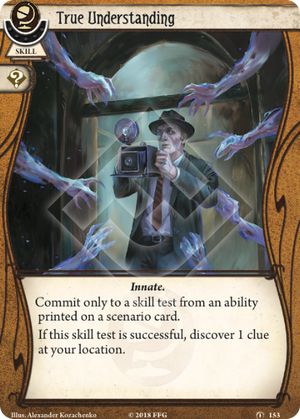This is a hard card to review because it's power fluctuates madly from scenario to scenario.
"Text printed on a scenario card" basically means treachery tests, unique location tests, parlay tests and anything printed on an act/agenda. This specifically means you cant use True Understanding while investigating, attacking or evading.
The limitation and the essential nature of the game basically causes this card to most often trigger during defensive tests during treachery draws and thus, the card is drastically more likely to trigger if your ability to pass tests is good to begin with. This, most common, way to get True Understanding to trigger means that you need to be located where clues are when you attempt the test, this by itself can be tough.
Another consideration when evaluating this card: 1 Clue might not actually be useful to you to begin with, Rex Murphy, Mystics and Seekers with Archaic Glyphs tend to pick clues up in bulks of 2 so the single clue wont always be useful to begin with. Thus it's better to use this card in a deck where picking up clues singly is a common occurrence (For example when Daisy Walker or Norman Withers are around).
.
Now the flip-side. True Understanding might at this point seem like it needs a pile of things to compile to be worth taking, but when they do the incredibly strong result is most definitely worth the wait, a free, action-less, resource-less, clue tacked onto a successful treachery test or something more scenario unique. You can always try to plan for using True Understanding by ending rounds on clue locations (like many characters do for Evidence! or Scene of the Crime) or by bringing the test to the location via common treacheries like Frozen in Fear.
.
TL:Dr. Hard to trigger, extremely useful when it does.
